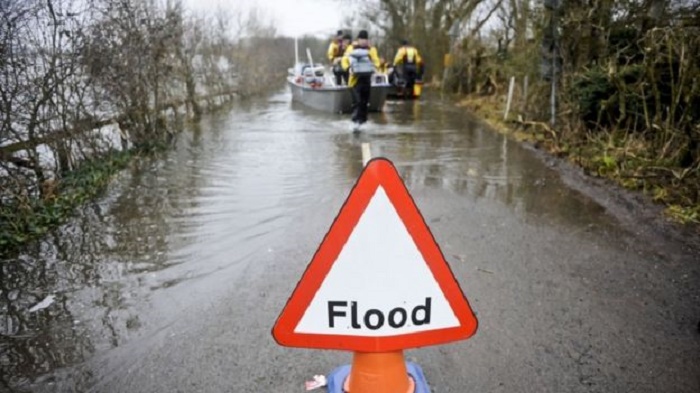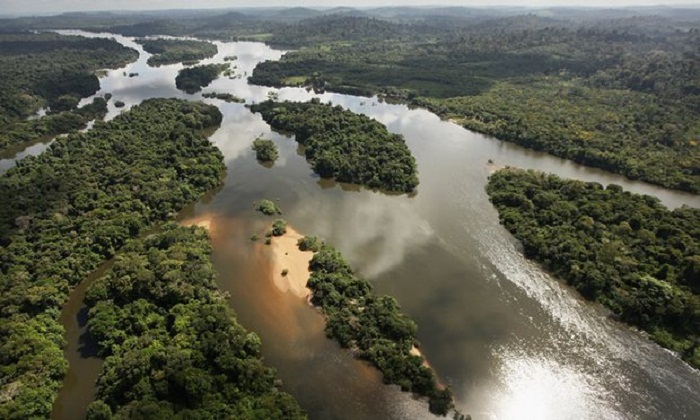The committee also warns that poor farming means the most fertile soils will be badly degraded by mid-century.
And heat-related deaths among the elderly will triple to 7,000 a year by the 2050s as summer temperatures rise.
The UK is not prepared, the committee says, for the risks posed by climate change from flooding and changing coasts, heatwaves, water shortages, ecosystem damage and shocks to the global food system.
The projections are based on the supposition that governments keep promises made at the Paris climate conference to cut emissions - a pledge that is in doubt.
The committee says if emissions are allowed to spiral, London summer temperatures could hit 48C (118F) in an extreme scenario, although the advisers say they don`t expect that to happen.
The report from 80 authors is the most comprehensive yet on the potential impact of climate change on the UK.
`Cascade of risks`
It identifies 60 risks and opportunities - many of them happening already as the climate has warmed.
Its conclusions on the inter-linking nature of threats to infrastructure is based on recent research.
The chairman of the committee`s adaptation sub-committee, Prof Sir John Krebs, told BBC News: "Infrastructure could be affected in a way that interacts.
"So, if you take electricity supply, the delivery of fuel to power stations might be affected by flooding which would then affect electricity.
"Then look at flooding… if bridges are affected then they carry electricity cables and communications infrastructure, so we have to look not just at how each piece of infrastructure works but how they interact together.
"There could be a cascade of risks."
Higher food prices
On food and farming, the committee warns that UK shoppers could face higher food bills as imported crops like soya are harmed by heat or drought.
It says farming in the UK might benefit from more warmth but warns that soils are likely to dry out quicker, and that rain is more likely to arrive in unhelpful downpours.
The committee also says some of the UK`s most fertile land - the peat fields of the East Anglia fens - are suffering badly from decades of intensive farming.
Prof Krebs said 85% of the peat had been washed or blown away, and the rest would follow in coming decades unless farmers were more careful.
On over-heating, the committee forecasts a risk to the health of elderly people in homes, hospitals and care homes.
Prof Krebs said he had tried to insert rules in recent housing legislation to oblige builders to ensure adequate ventilation, but the government deemed these onerous to business.
Dr Sari Kovats, from the London School of Hygiene and Tropical Medicine, said: "We are far from prepared to deal with these changes.
"More heatwaves in the UK are also likely, yet there are no comprehensive policies in place aimed at reducing the risk of overheating in new and existing homes."

Risks and opportunities
Among the other risks needing more action the committee mentions:
• Coastal change risks to communities, businesses and infrastructure
• Risk of shortages in public water supply with impacts on freshwater ecology, water for agriculture, energy generation and industry
Opportunities for the UK from climate change include:
• Economic opportunities for UK businesses from an increase in global demand for adaptation-related goods and services, such as engineering and insurance
• Milder winters should reduce the costs of heating, helping to cut winter cold deaths.
Prof Piers Forster, from the University of Leeds, said: "The UK gets off lighter than many countries but this important report confirms that we are already seeing damage to homes, businesses and livelihoods.
"There are a few opportunities hidden in the mix but the future is clearly one of increased risk that we need to prepare for now."
The report will inform the government`s climate change adaptation strategy, due in 2018. Ministers are about to publish their National Flood Resilience Review.
A government spokesman said: "We are committed to making sure the UK is prepared for the challenges of climate change.
"That is why we are investing record amounts in flood defences, developing a long-term plan for the environment and reviewing planning legislation so new construction projects are sustainable and resilient."
















































